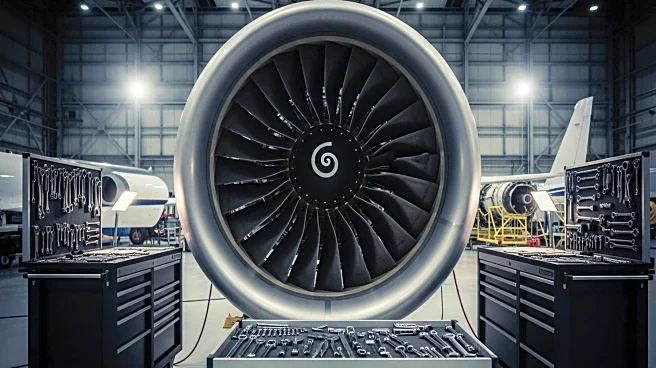What's Happening?
The European engine maintenance, repair, and overhaul (MRO) sector is facing significant changes and challenges, as discussed at the AeroEngines Europe event in Hamburg. The industry is preparing for an increase in demand for engine MRO services, particularly for narrowbody aircraft like the Airbus A320 and Boeing 737. The event highlighted the need for increased shop capacity and the development of repair techniques for new-generation engines such as the Leap and geared turbofan (GTF). Industry leaders, including representatives from Lufthansa Technik and MTU Maintenance, emphasized the importance of strategic partnerships and investments in capacity to meet future demand. The appointment of Johannes Bussmann as CEO of MTU Maintenance is expected to strengthen the company's MRO capabilities, leveraging his extensive experience in the industry.
Why It's Important?
The developments in the European engine MRO sector have significant implications for the global aviation industry. As demand for narrowbody aircraft continues to grow, the ability to efficiently maintain and repair engines is crucial for airlines to manage costs and ensure operational reliability. The focus on expanding MRO capacity and developing new repair techniques will help address current challenges such as supply chain constraints and long turnaround times. The leadership change at MTU Maintenance could lead to strategic advancements in engine technology and MRO services, benefiting airlines and passengers alike. The industry's efforts to enhance repair capabilities and capacity are vital for supporting the anticipated growth in air travel and aircraft deliveries over the next decade.
What's Next?
The European engine MRO sector is expected to see continued investment in shop capacity and repair development. Industry players are likely to form more strategic partnerships to expand their capabilities and address the growing demand for engine services. The focus will be on developing quicker repair techniques for new-generation engines, which could take several years to materialize. The appointment of Johannes Bussmann at MTU Maintenance may lead to new initiatives in engine technology and MRO services, potentially influencing the broader industry. As airlines continue to manage mixed fleets, risk management and availability will remain key considerations in fleet strategy decisions.
Beyond the Headlines
The shift towards mixed fleets among European airlines reflects a broader trend in risk management and strategic planning. By diversifying their fleets, airlines can mitigate risks associated with relying on a single aircraft manufacturer, such as delays and technical issues. This approach also allows airlines to take advantage of competitive pricing and availability, as seen with Pegasus Airlines' decision to operate both Airbus and Boeing aircraft. The industry's focus on repair development and capacity expansion highlights the importance of innovation and collaboration in addressing current challenges and preparing for future growth.










